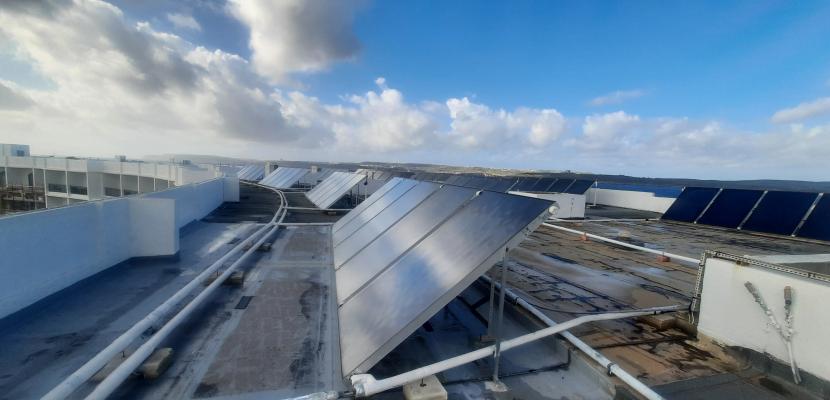
Shifting to solar heating for potable hot water and pool heating in a large hotel

About this good practice
Hot water consumption is one of the resort’s highest energy demands. Rising light fuel oil costs, the EU’s upcoming fossil-fuel boiler ban, and the 2050 decarbonisation target prompted the resort to transition to renewable energy, beginning with solar water heating. To integrate solar water heating at the resort, 103 solar collectors (206 m2) are connected to a thermal battery that is backed up with the existing light fuel oil boiler. Priority is given to solar heating usage, especially during summertime when tourist numbers soar. Since 2022, an average of 11,000 litres of hot water is produced per day and indoor pool heating is covered for over 80% of the year.
The main stakeholder is the resort operator. The beneficiaries are the resort and the guests.
Resources needed
Total budget of €187,195 (€152,582 for solar heating system and €34,613 for installation).
Evidence of success
The solar thermal plant achieved an average annual saving of 28% in light heating oil (36,510 litres), cutting CO₂ emissions by 95 tonnes/ year (2023–2024). It maintains pool heating at 29°C for over 80% of the year. The project was successfully co-financed under the Malta Enterprise Smart and Sustainable Investment grant (2021–2023) to promote renewable energy.
Potential for learning or transfer
• Rooftop solar heating is a highly cost-effective solution for hotels with high hot water demand, with no redundancy as excess heat warms the indoor pool.
• The solar heating system enhances the hotel's green image, making its commitment to sustainability visible to guests. This, in turn, raises awareness of eco-friendly practices and encourages responsible hot water use.
• The opportunity of benefitting from available EU and national funds to install renewable energy is fully utilised, supporting the transition to lower carbon footprint.
• To avoid legionella contamination, a solar battery is used, meaning water is heated as it passes through the heat exchanger that is placed within the solar tank. No direct contact between the fluid in the solar panels and the potable water is made.
• The next step is to completely replace the light fuel oil boiler with high temperature heat pump water heating systems.
Further information
Energy and Water Sustainability Award - Paradise Bay Resort Ltd
Website
Good practice owner
You can contact the good practice owner below for more detailed information.